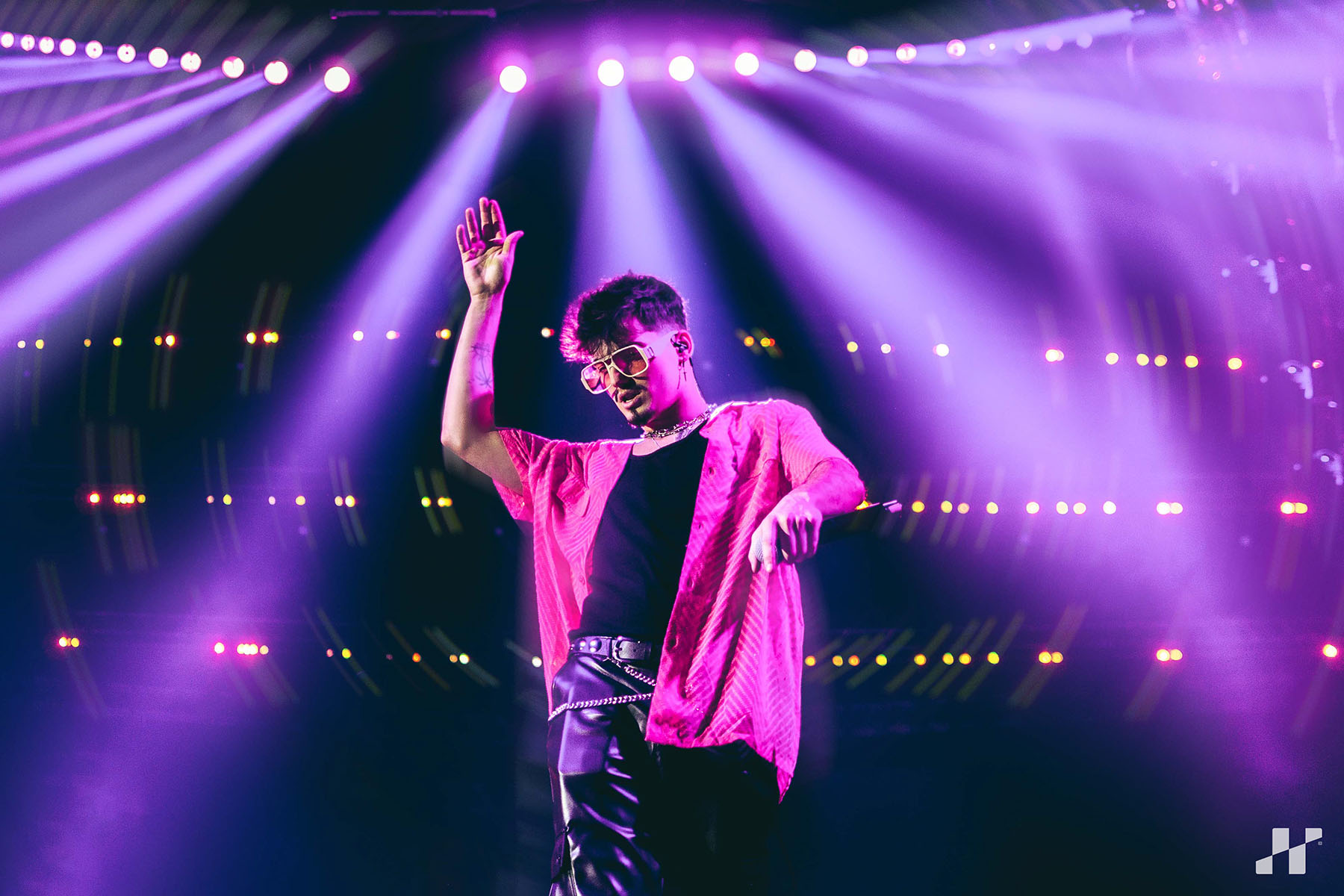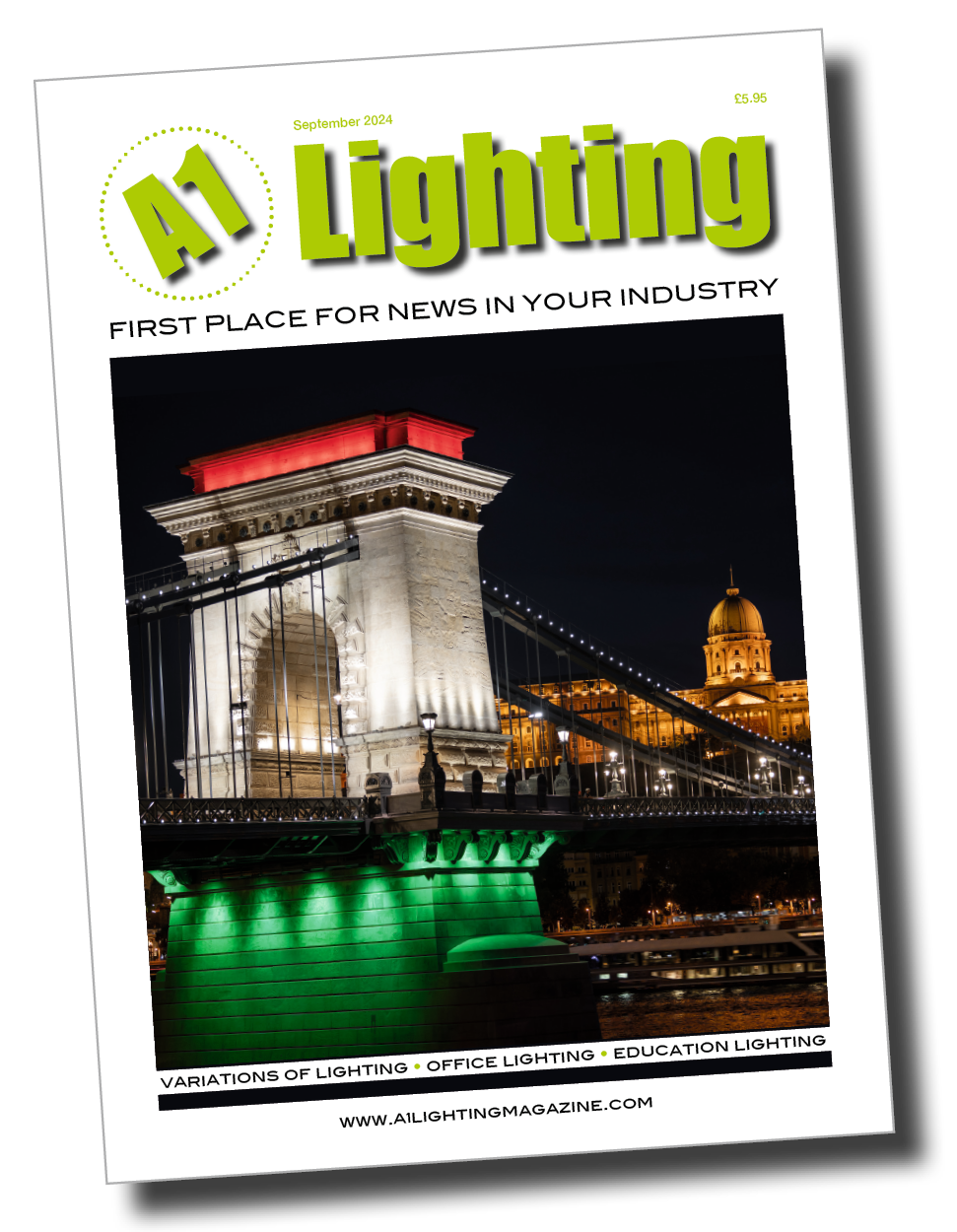
Máté Lukacsovics and Ale Geszler from Budapest, Hungary-based lighting design studio Highlight Studios created an eye-popping design for a high-profile one-off concert by Hungarian artist and pop-rock band Valmar at the 12,500-capacity Budapest Arena which was completely sold out.
It was the band’s largest concert to date, and the brief was to create a memorable lighting design that met the occasion and thrilled everyone involved, from the artist and his production team to his enthusiastic and ever-growing fanbase.
Máté and Ale utilised over 150 Robe moving lights – a combination of iFORTES, Pointes and Tarrantulas – to help energise a great show.
Their starting point for lighting the show was the production design idea from show director Roland Mák who imagined the stage as a gigantic time machine, with the concert designed as a 2-hour gameplay session hosted by an AI character lurking on the outer IMAG screens.
The game involved performers and the audience completing various challenges and moving up to the next levels, and the 96 Pointes on the lighting rig were an integral part of this gameplay visualisation.
Máté, Ale, Roland and choreographer Sándor Kurucz all worked closely on realising this exciting concept. The set, video and lighting designs were all based around Roland’s vision which Máté drew proportionally into the Arena’s own 3D model.
A V-shaped structure – the largest part on an automation system – was central to the aesthetic, flown above a runway coming off the stage, enabling over 40 lights to be moving above the audience during the show.
The LED wall setup followed Roland’s time machine, with an LED floor providing gameplay visuals with instructions and cards appearing on it for the performers. The AI character alternated with a live mix on the two IMAG screens, and the time machine interface also appeared on these same screens.
The rear V-shaped main screen mainly featured textures and more informal background gameplay visuals.
Máté, Ale and Roland all agreed at the outset that beam style fixtures should play a major role in filling the space and emphasising key moments of the game narrative. “It was important to choose a multifunctional light, with weight also a crucial factor due to the additional dynamics of the largest V-truss, which moved throughout the show,” explained Máté. Wanting a lighter, more compact but very bright fixture, they looked at Pointe.
“Pointes in this quantity are always impressive,” says Máté, so he and Ale were delighted when rental company Light Positive could provide such a large quantity!
The 96 x Pointes were at the very essence of the show, and used extensively during the choruses where Máté notes, “The speed was beneficial, especially for the faster and rockier songs in the set list, allowing us to create high-impact effects with this number of lights!”
The Pointes were primarily used in beam mode, however for slower songs, a combination of prisms and gobos facilitated some truly dramatic epic looks. The beam reducers were utilised to boost the visibility of performers, especially when using the brighter colours, ensuring the focus stayed on them rather than lighting being dominant. “We also appreciate the beam reducer when achieving laser-simulation effects,” says Ale.
The 18 x iFORTEs were rigged on the rear trusses and kicked in beautifully as powerful back beams and effects, with the 40 Tarrantulas lining both sides of the catwalk on 20-metre straight trusses flown directly above.
Ale admits that the iFORTE was a “huge surprise” in terms of its searing brightness. “LED profile lights featuring precision gobos and such deep saturated colours was once unimaginable, but iFORTE has completely changed that perception,” he stated, adding that they believe iFORTE will become “the most popular product in its class on the market”.
Despite the relatively small quantity of 18 iFORTE luminaires, their substantial brightness “was more than sufficient” confirms Máté. iFORTEs were used for spot effects and highlighting the musicians.
They loved the CMY colour mixing which enables the creation of amazing pastel shades, and the Tint (plus/minus green) channel was extremely useful in finessing for camera adjustments.
The Tarrantulas were used for washing the stage and the catwalk.
It was vital for the dancers and musicians to be well-lit, especially with saturated colour as the production was also recorded for TV. At times, up to 100 dancers were onstage simultaneously, so the 40 Tarrantulas worked hard and were needed to ensure excellent key lighting for both areas for the broadcast/recording crew.
Máté & Ale both believe that Robe products are “among the highest quality” currently available and therefore Robe is one of their preferred and often specified brands. “Accuracy and reliability are crucial for us,” says Máté, noting that they often spend hours adjusting positions and fine-tuning during focusing.
Ale mentions that Light Positive and its CEO, Károly Bereczki, share this view, and the company has invested in a large inventory of Robe moving lights.
The show’s video content was produced by Kata Kertész and her team. Despite tight deadlines, Máté and Ale coordinated extensively with them, exchanging 3D renderings discussing proportions and colour schemes.
A favourite song in the set was the finale, “Színvak” (Colorblind), which specifically featured interactions between visuals and light. Visual content was mapped across the lighting elements throughout the song, including lasers, and sudden colour shifts and fades created a unique effect.
Máté and Ale spent two full days working with Dominika Sárhegyi from the video crew on this song, to ensure nanosecond frame accuracy between lighting and visual transitions.
The concert also featured numerous between-song timecode-based interludes – when the time machine came to life as the AI character and assigned new tasks to the audience and performers – with the time machine highlighted by lighting and visuals ‘technocratic’ effects as the story embraced the notion of technology as integral to the production.
The biggest creative challenge of delivering this show was harmonising all the disciplines and sections of the show quickly and efficiently and everyone was proud of reaching this goal given the timeframe, with just a few modifications needed during rehearsals.
Technically, the execution team faced a truly complex task because, in addition to rigging and automation, they had to fly the LED walls and lights with great precision. “Light Positive and the Szatyi Stage Team who provided the LED wall did a fantastic job,” concludes Ale.
Lasers and MDG atmosphere were supplied by Prolaser Kft, with automation and stage motion by E-Motion Technologies Kft.
Máté and Ale as Highlight Studios remain staunchly independent in their brand choices as appropriate to each individual project, and their opinion is often sought by rental companies who are comparing lighting fixtures ahead of an investment.
They particularly enjoy using Robe products on their TV work where perfect colour temperature is essential. “We can’t imagine a TV show without a RoboSpot system,” says Máté.
During tours, they have experienced the durability and robustness of Robe equipment which also provides a great sense of security.
Photo: Zsolt Kósa.













